Seattle leaders on Tuesday repealed a tax on large companies such as Amazon and Starbucks after a backlash from businesses, a stark reversal from a month ago when the City Council unanimously approved the effort to combat a growing homelessness crisis.
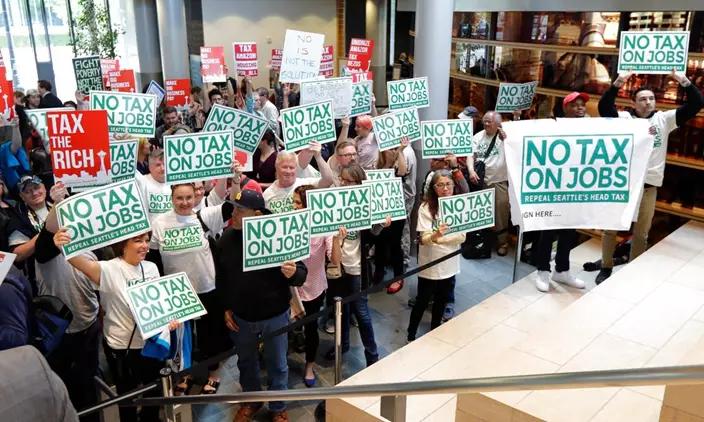
People in favor of the repeal of a tax on large companies such as Amazon and Starbucks that was intended to combat a growing homelessness crisis hold signs that read "No Tax on Jobs" as they wait for the start of a Seattle City Council meeting, Tuesday, June 12, 2018, at City Hall in Seattle. Members of the Council were expected to vote Tuesday on whether or not to repeal the tax. (AP Photo/Ted S. Warren)
A divided crowd chanted, jeered and booed at the council meeting, drowning out the leaders as they cast a 7-2 vote. People shouted, "Stop the repeal," as others unfurled a large red banner that read, "Tax Amazon." An opposing group held "No tax on jobs" signs.
Click to Gallery
Seattle leaders on Tuesday repealed a tax on large companies such as Amazon and Starbucks after a backlash from businesses, a stark reversal from a month ago when the City Council unanimously approved the effort to combat a growing homelessness crisis.
A divided crowd chanted, jeered and booed at the council meeting, drowning out the leaders as they cast a 7-2 vote. People shouted, "Stop the repeal," as others unfurled a large red banner that read, "Tax Amazon." An opposing group held "No tax on jobs" signs.
Businesses and residents demanded more accountability on how Seattle funds homelessness and housing and said the city should take a regional approach to the problem. Many worried that Amazon and others would leave the city as the companies sharply criticized the tax.
It poured $68 million into the effort last year and plans to spend more this year. The tax would have raised roughly $48 million annually.
Councilwoman Teresa Mosqueda voted against the repeal, saying the lack of a replacement strategy would mean more months of inaction.
The vote showed Amazon's ability to aggressively push back on government taxes, especially in its affluent hometown where it's the largest employer with more than 45,000 workers and where some have criticized it for helping cultivate a widening income gap that is pricing lower-income employees out of housing.
The tax was proposed as a progressive revenue source aimed at tackling one of the nation's highest homelessness numbers, a problem that hasn't eased even as city spending grew.
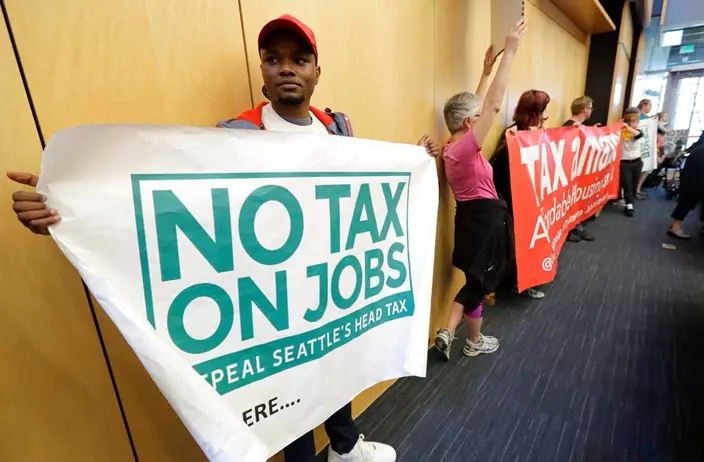
A demonstrator in favor of the repeal of a tax on large companies such as Amazon and Starbucks that was intended to combat a growing homelessness crisis holds a sign that reads "No Tax on Jobs" as he waits for the start of a Seattle City Council meeting, Tuesday, June 12, 2018, at City Hall in Seattle. Members of the Council were expected to vote Tuesday on whether or not to repeal the tax. (AP Photo/Ted S. Warren)
Businesses and residents demanded more accountability on how Seattle funds homelessness and housing and said the city should take a regional approach to the problem. Many worried that Amazon and others would leave the city as the companies sharply criticized the tax.
The online retailer even temporarily halted construction planning on a new high-rise building near its Seattle headquarters in protest. Amazon called the vote "the right decision for the region's economic prosperity."
The company is "deeply committed to being part of the solution to end homelessness in Seattle," Drew Herdener, an Amazon vice president, said in a statement.
City leaders underestimated the frustration and anger from residents, businesses and others over not just a tax increase but also a growing sense that homelessness appears to have gotten worse, not better, despite Seattle spending millions to fight it.
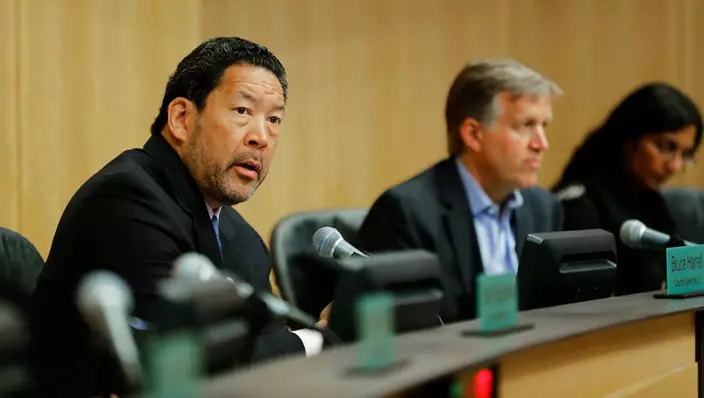
Seattle City Council president Bruce Harrell, left, speaks, Tuesday, June 12, 2018, during a council meeting at City Hall in Seattle. Harrell and other members of the Council were expected to vote Tuesday on whether or not to repeal a tax on large companies such as Amazon and Starbucks that was intended to combat a growing homelessness crisis. (AP Photo/Ted S. Warren)
It poured $68 million into the effort last year and plans to spend more this year. The tax would have raised roughly $48 million annually.
But a one-night count in January found more than 12,000 homeless people in Seattle and the surrounding region, a 4 percent increase from the previous year. The region saw 169 homeless deaths in 2017.
Many supporters called the repeal a betrayal and said the tax was a step toward building badly needed affordable housing. They booed council members, imploring them to keep it and fight a coalition of businesses trying to get a referendum overturning the tax on the November ballot.
Several leaders, including three who sponsored the legislation but voted to repeal it, lamented the reversal and conceded they didn't have the resources to fight the referendum.
Councilwoman Lisa Herbold said it "was truly our best option" and that she repealed it with a heavy heart. She lashed out at business interests for blaming the problems on government inefficiencies.
"Gutless!" someone shouted as she explained her rationale. She and others said they didn't want to spend the next several months in a political fight that would do nothing to address urgent needs.
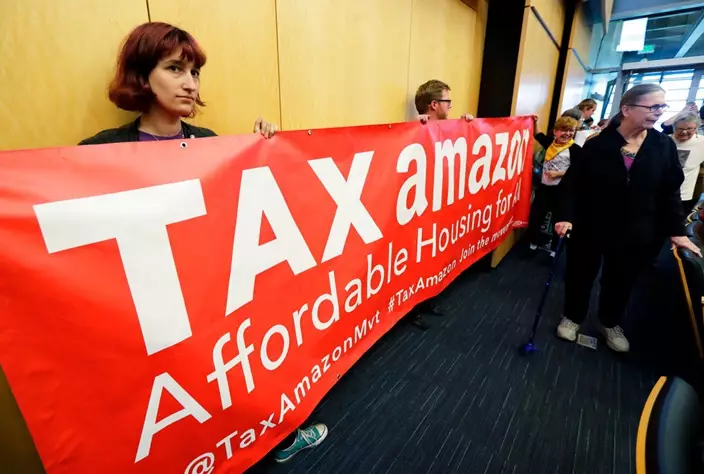
Demonstrators opposing the repeal of a tax on large companies such as Amazon and Starbucks that was intended to combat a growing homelessness crisis hold a sign that reads "Tax Amazon" as they wait for the start of a Seattle City Council meeting, Tuesday, June 12, 2018, at City Hall in Seattle. Members of the Council were expected to vote Tuesday on whether or not to repeal the tax. (AP Photo/Ted S. Warren)
Councilwoman Teresa Mosqueda voted against the repeal, saying the lack of a replacement strategy would mean more months of inaction.
"It was not a tax on jobs," she said, calling it "a much needed down payment to our housing crisis."
Denise Moriguchi, chief financial officer at Asian grocery store chain Uwajimaya, told the council that she doesn't like seeing people living in tents but that the tax was not the answer. She said it would hurt small businesses with thinner profit margins than Amazon.
Seattle's so-called head tax would have charged companies about $275 per full-time worker each year to fund affordable housing and homeless services. It targeted nearly 600 businesses making at least $20 million in gross revenue and would have taken effect next year.
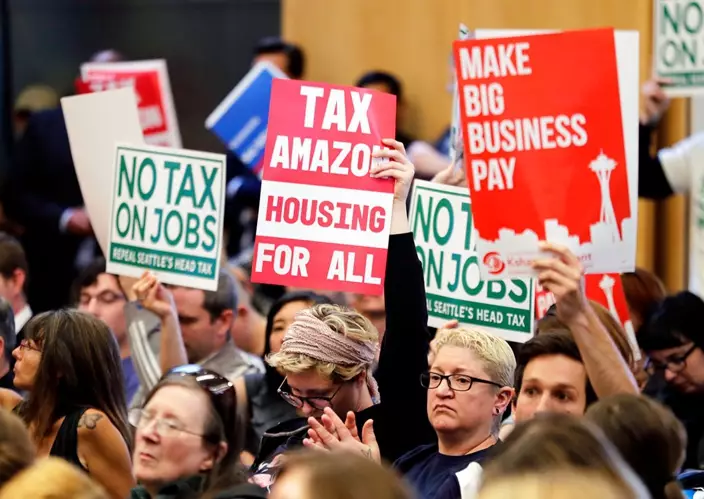
People attending a Seattle City Council meeting hold signs that read "Tax Amazon, Housing for All," and "No Tax on Jobs" listen to public comment on the debate over a possible council vote whether or not to repeal of a tax on large companies such as Amazon and Starbucks that was intended to combat a growing homelessness crisis, Tuesday, June 12, 2018, at City Hall in Seattle. (AP Photo/Ted S. Warren)
Days after it passed, the business-backed No Tax On Jobs campaign began gathering signatures for the ballot and raised more than $280,000 in cash contributions in just weeks.
It remains to be seen whether Seattle's retreat will have a chilling effect on other cities considering taxes on big tech companies to help mitigate the effects of growth.
The City Council in Mountain View, California, where Google is based, will vote June 26 on whether to put a similar measure before voters in November. The "Google tax" aims to alleviate transportation woes and high housing costs in the Silicon Valley city south of San Francisco.
Mountain View Mayor Lenny Siegel said Seattle's about-face hasn't changed his support for the tax.
"It appears that we have a better relationship with our business than Seattle does," Siegel said.
He said Google hasn't taken a position on the proposal and that no "groundswell" of opposition has materialized from the Internet search giant and other companies.
Amazon has been aggressive about fighting taxes. It recently said it would block Australians from purchases on its international websites after the nation planned to impose a 10 percent consumption tax on online retailers for goods shipped to Australia.
BELEM, Brazil (AP) — The bodies of nine migrants found on an African boat off the northern coast of Brazil’s Amazon region were buried Thursday with a solemn ceremony in the Para state capital of Belem.
Fishermen off the coast of Para found the boat adrift April 13, carrying the bodies that were already decomposing. Brazilian officials later said documents found in the vessel indicated that the victims were migrants from Mali and Mauritania and that the boat had departed the latter country after Jan. 17.
Brazil's federal police said later that the bodies were of adults or teenagers whose exact age could not be determined. Agents found two documents — an identity card from Mauritania and a register of entry in Mauritania that belonged to someone from Mali.
The deceased were buried in a secular ceremony organized by a number of groups involved in their recovery, such as the U.N. Refugee Agency, the Red Cross and the International Organization for Migration, as well as Brazilian police, navy and civil defense agencies.
A tropical rain fell as their coffins were lowered into graves dug into the earth and those present watched in respectful silence.
Their roughly 12-meter (39-foot) boat was carrying 25 raincoats and 27 mobile phones, suggesting the original number of passengers was significantly higher. This also implies that people of other nationalities may have been among the deceased, local officials have said.
Brazil's federal police said it is unlikely they will extract any information from the phones due to the long time of oxydation they were subjected to. The force also added they had found paper notes in the boat with phone numbers from Mauritania, Mali and Congo. A kind of stove and two containers that could have carried water or fuel were also among the remains.
It was a rustic blue-and-white fiberglass boat that, when found, had neither motor, tiller nor rudder. Its canoe shape is similar to Mauritanian fishing boats often used by migrants fleeing West Africa and aiming to enter the European Union via Spain’s Canary Islands.
An Associated Press investigation published last year revealed that in 2021 at least seven boats from northwest Africa were found in the Caribbean and Brazil. All carried dead bodies, like the vessel found in Para.
So far, none of the victims have been identified. Authorities said the manner of their burial would allow for subsequent exhumations in case families of the deceased were located and wished to transfer the bodies back to their home countries.
Brazil’s criminology institute in the capital Brasilia is carrying out forensic examinations of the remains, and the Federal Police say they are in contact with Interpol and foreign organizations to provide eventual results.
This year the number of people attempting the crossing from the northwest coast of Africa to the EU has seen a 500% spike, with the majority departing from Mauritania, according to Spain’s interior ministry. But it is a dangerous route with strong Atlantic winds, and boats that go off course can stay adrift for months and be swept away to distant destinations, often leading migrants to die of dehydration and malnutrition.
The reasons pushing people toward such boats are varied and intertwined: a lack of jobs and prospects of a better life, impacts of climate change, growing insecurity and political instability, among others.
More than 14,000 African migrants have reached the Canary Islands so far this year, according to the Spanish ministry. In February, the EU and Mauritania signed a 210 million euro ($225 million) deal aimed at cracking down on people smuggling and deterring migrant boats.
With hundreds more West African migrants reported missing, families in Mauritania have set up a commission to search for loved ones, and are anxiously awaiting information from Brazil.
Bachirou Saw of Mauritania buried one of his nephews earlier this year who had died during the arduous Atlantic crossing shortly after reaching the Spanish island of El Hierro. He’s still looking for another nephew, Kadija Saw, who departed in January and is nowhere to be found. He’s following news from Brazil closely.
Saw, who also has Spanish citizenship and immigrated to Europe by plane 30 years ago when it was easier to get a visa, said he’s been trying to convince young men not to emigrate by boat. He created a WhatsApp group to alert migrants to the perils of the ocean voyage and to share information with desperate relatives, and has counted at least 1,500 missing in the last six months from Mauritania, Mali and Senegal. While most of the migrants embarking to Europe are men, there is an increasing number of women getting aboard boats, too.
“I have their ID’s on my phone,” said Saw, who receives messages every day from families looking for their loved ones. Together with others, they’ve organized trips to Morocco to look inside prisons and morgues. Moroccan authorities often intercept migrants trying to reach Spain and detain them before deporting them. But Saw’s nephew wasn’t there either. He also visited the Canary Islands to check the morgues there.
Saw’s sister is desolate. “Every day she buys credit to listen to our audios, she lives for this, she doesn’t eat, she is thin, just thinking about her son,” Saw said. And she’s not alone.
“It’s very sad, half of the villages are dancing because their sons have arrived (in Spain),” he said, “but the other half cries because they’ve lost their sons in the ocean.”
Carneiro reported from Rio de Janeiro. Associated Press writer Renata Brito contributed from New York.
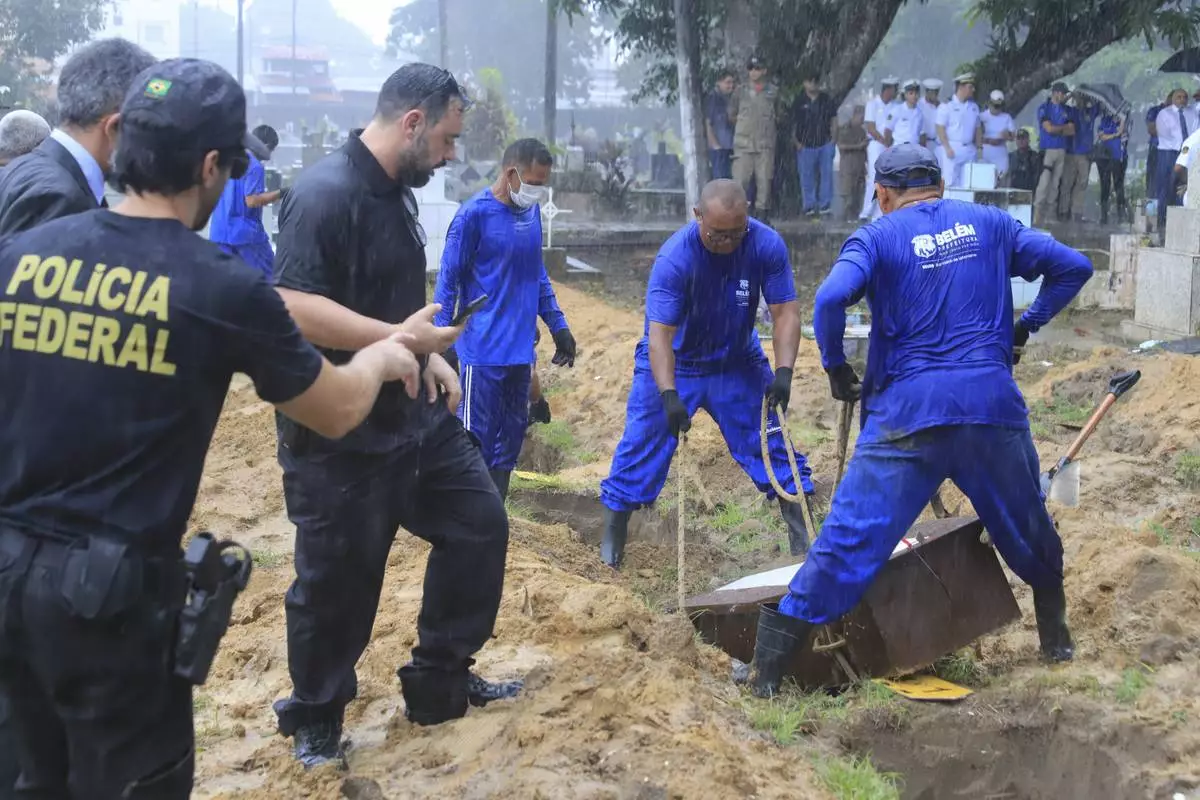
Cemetery workers lower into a grave, a coffin that contains the remains of an unidentified migrant, at the Sao Jorge cemetery, in Belem, Para state, Brazil, Thursday, April 25, 2024. The bodies of nine migrants found on an African boat off the northern coast of Brazil's Amazon region were buried Thursday with a solemn ceremony. (AP Photo/Paulo Santos)
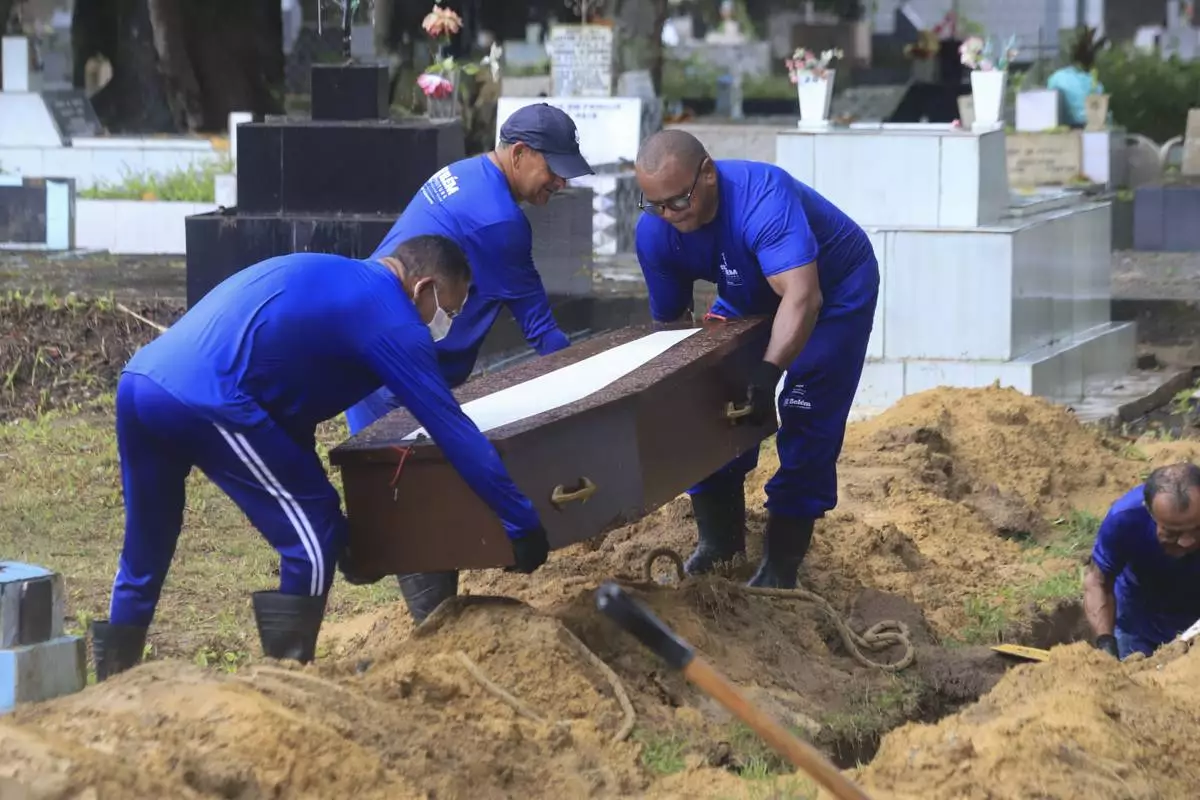
Cemetery workers lower into a grave, a coffin that contains the remains of an unidentified migrant, at the Sao Jorge cemetery, in Belem, Para state, Brazil, Thursday, April 25, 2024. The bodies of nine migrants found on an African boat off the northern coast of Brazil's Amazon region were buried Thursday with a solemn ceremony. (AP Photo/Paulo Santos)
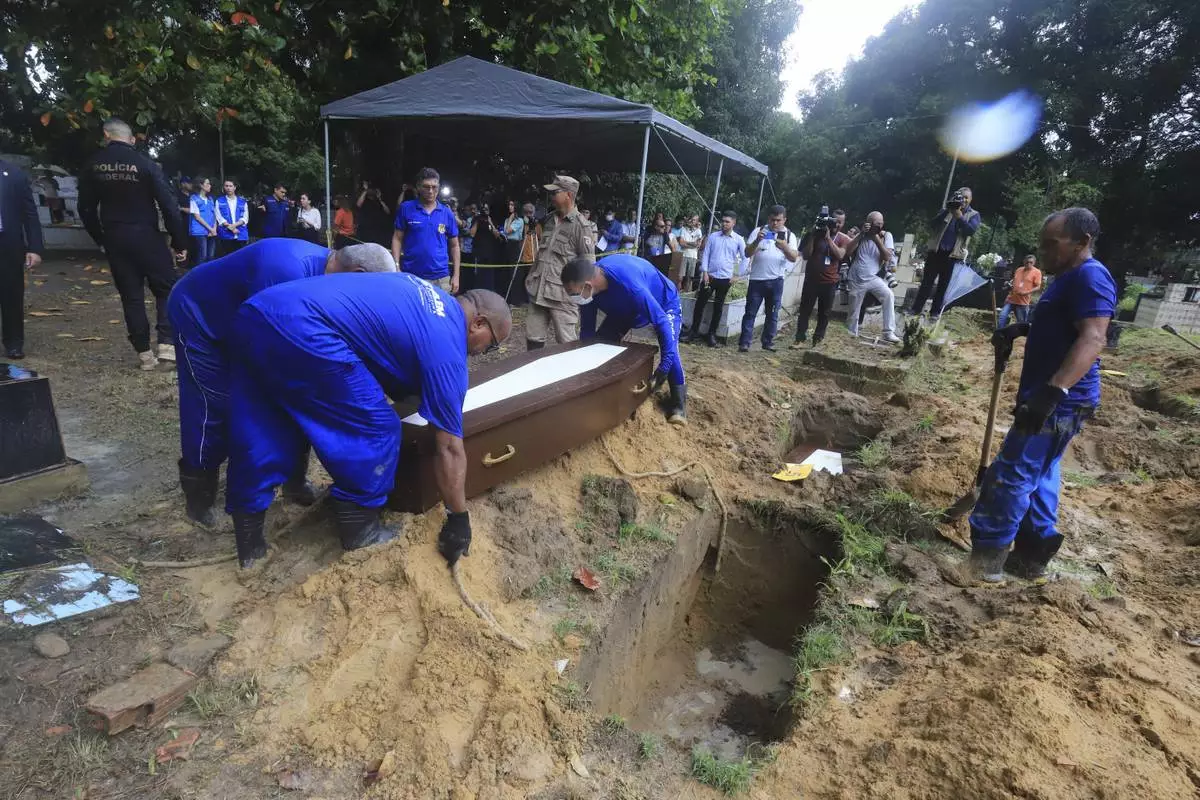
Cemetery workers lower into a grave, a coffin that contains the remains of an unidentified migrant, at the Sao Jorge cemetery, in Belem, Para state, Brazil, Thursday, April 25, 2024. The bodies of nine migrants found on an African boat off the northern coast of Brazil's Amazon region were buried Thursday with a solemn ceremony. (AP Photo/Paulo Santos)
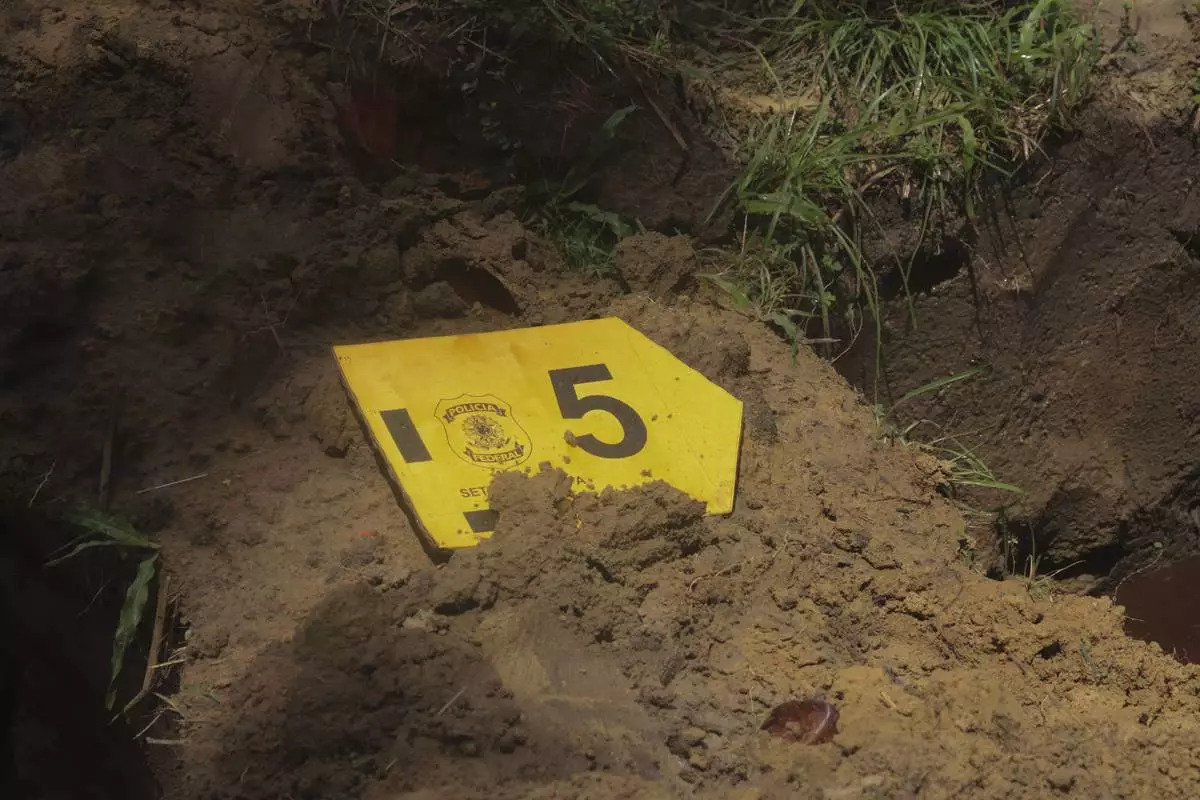
A label with the number 5 to mark one of nine unidentified migrants, sits on a freshly dug grave during a burial service, at Sao Jorge cemetery, in Belem, Para state, Brazil, Thursday, April 25, 2024. The bodies of nine migrants found on an African boat off the northern coast of Brazil's Amazon region were buried Thursday with a solemn ceremony in a cemetery. (AP Photo/Paulo Santos)
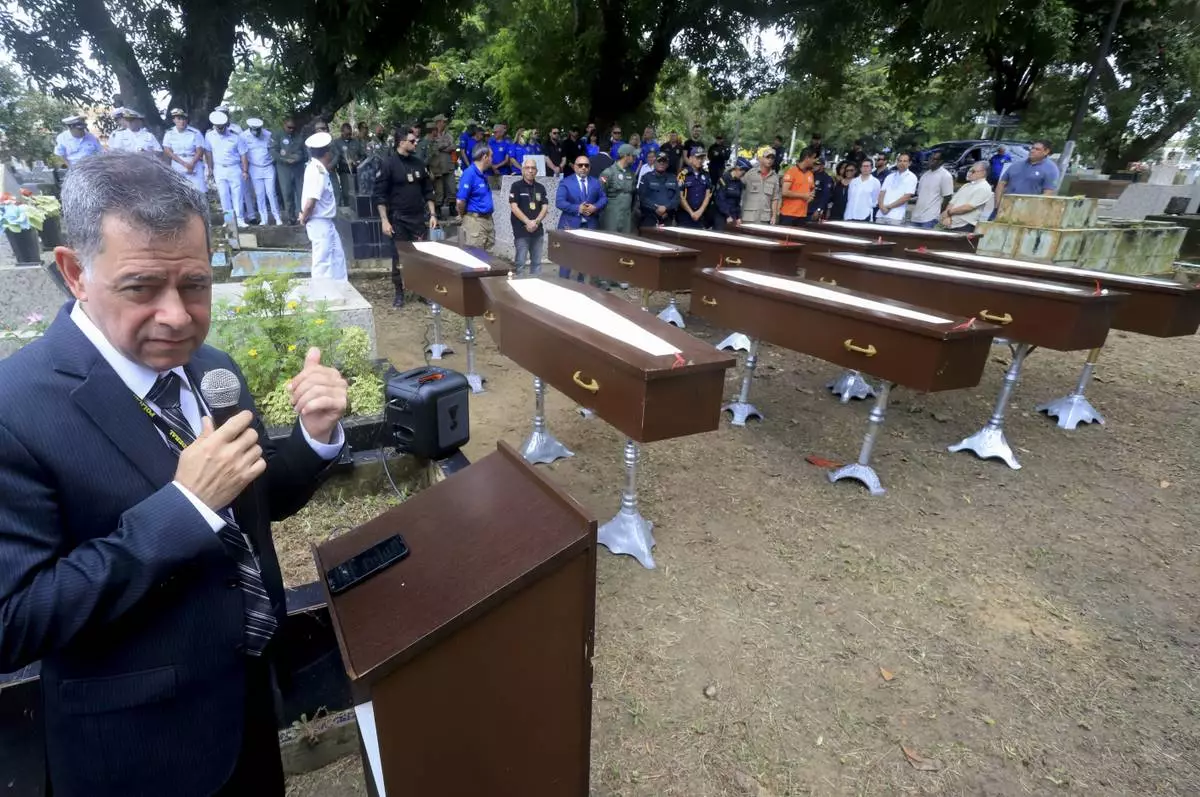
Federal police superintendent Jose Roberto Peres speaks during a burial service for nine unidentified migrants, at the Sao Jorge cemetery, in Belem, Para state, Brazil, Thursday, April 25, 2024. The bodies of nine migrants found on an African boat off the northern coast of Brazil's Amazon region were buried Thursday with a solemn ceremony. (AP Photo/Paulo Santos)
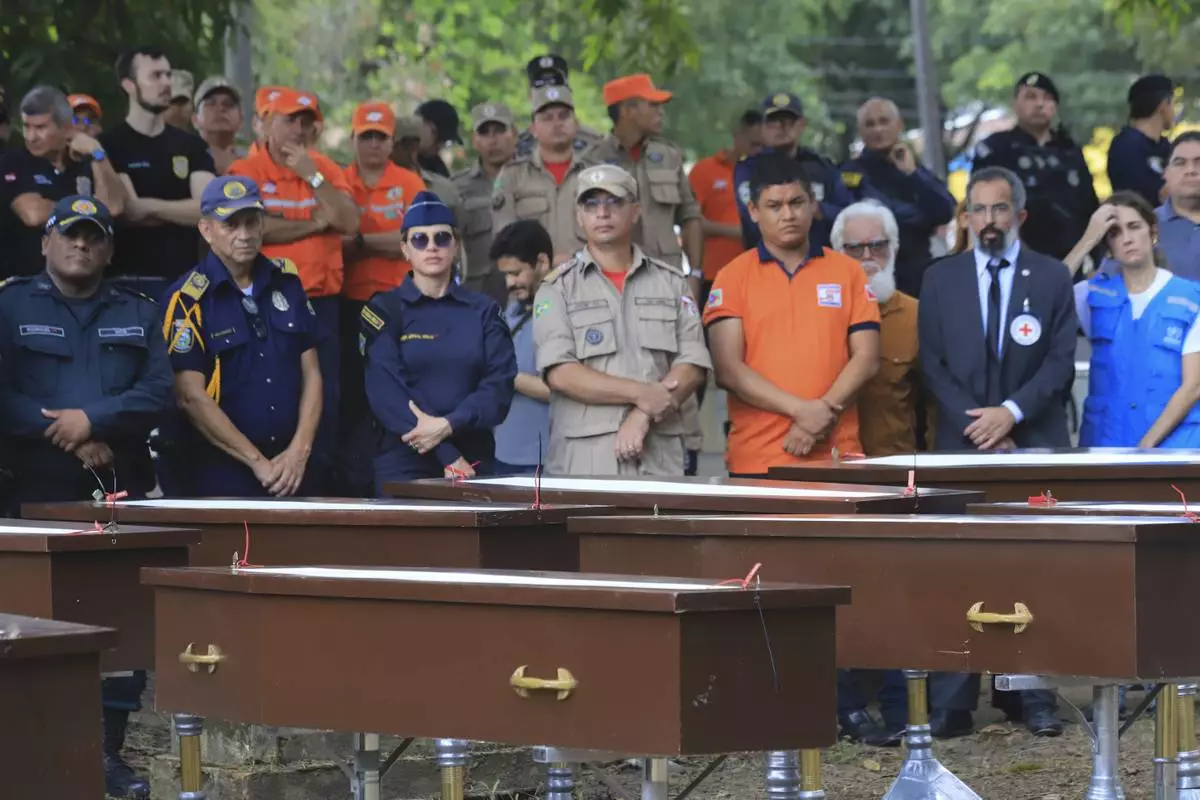
Police and firefighters attend the burial of nine unidentified migrants at the Sao Jorge cemetery, in Belem, Para state, Brazil, Thursday, April 25, 2024. The bodies of nine migrants found on an African boat off the northern coast of Brazil's Amazon region were buried Thursday with a solemn ceremony. (AP Photo/Paulo Santos)
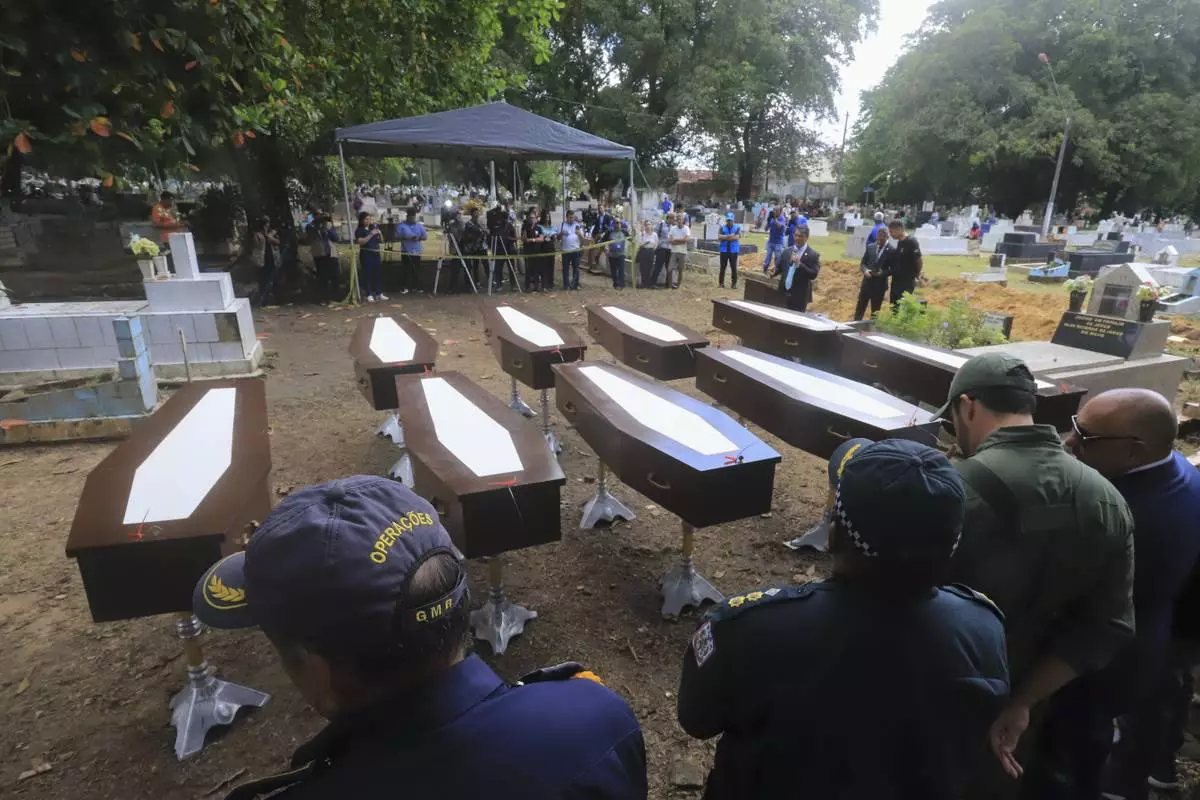
Authorities stand next to the nine coffins that contain the remains of unidentified migrants, at the Sao Jorge cemetery, in Belem, Para state, Brazil, Thursday, April 25, 2024. The bodies of nine migrants found on an African boat off the northern coast of Brazil's Amazon region were buried Thursday with a solemn ceremony. (AP Photo/Paulo Santos)
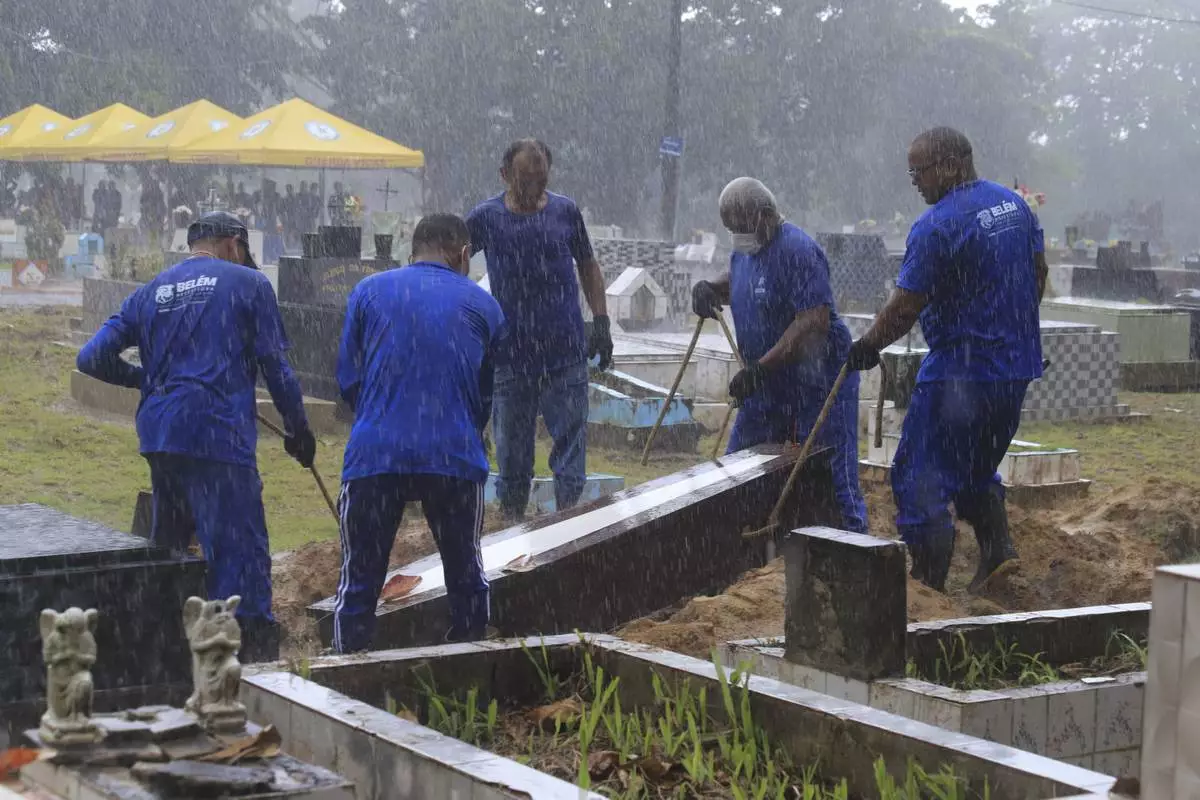
Cemetery workers carry the coffin that contains the remains of an unidentified migrant, at the Sao Jorge cemetery, in Belem, Para state, Brazil, Thursday, April 25, 2024. The bodies of nine migrants found on an African boat off the northern coast of Brazil's Amazon region were buried Thursday with a solemn ceremony. (AP Photo/Paulo Santos)






















